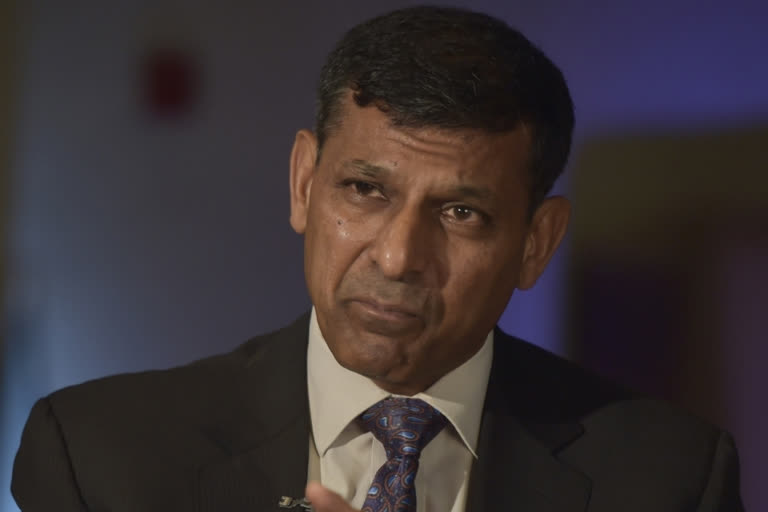New Delhi: Terming the 23.9 per cent fall in the economic growth in June quarter alarming, former Reserve Bank Governor Raghuram Rajan has said bureaucracy should come out of complacency and take meaningful action.
The current crisis requires a more thoughtful and active government, he said, adding “unfortunately, after an initial burst of activity, it seems to have retreated into a shell.”
"The sharp decline in economic growth should alarm us all. The 23.9 per cent contraction in India (and the numbers will probably be worse when we get estimates of the damage in the informal sector) compares with a drop of 12.4 per cent in Italy and 9.5 per cent in the United States, two of the most COVID-19-affected advanced countries," Rajan wrote in a post on his LinkedIn page.
He further said the bureaucracy needs to “be frightened out of their complacency and into meaningful activity. If there is a silver lining in the awful GDP numbers, hopefully it is that''.
Rajan, currently a professor at the University of Chicago, said the COVID-19 pandemic is still raging in India, so discretionary spending, especially on high-contact services like restaurants, and the associated employment, will stay low until the virus is contained.
The eminent economist pointed out that the government's reluctance to do more today seems partly because it wants to conserve resources for a possible future stimulus.
"This strategy is self-defeating," he opined.
Emphasising on the importance of government relief or support in the current scenario, Rajan said," Without relief measures, the growth potential of the economy will be seriously damaged."
He said Brazil, which has spent tremendously on relief, is seeing a much lower downgrade to medium term growth than India. "So, government officials who hold out the possibility of a stimulus when India finally contains the virus are underestimating the damage from a more shrunken and scarred economy at that point," Rajan noted.
Citing an example, Rajan said if one thinks of the economy as a patient, relief is the sustenance the patient needs while on the sickbed and fighting the disease.
"Without relief, households skip meals, pull their children out of school and send them to work or beg, pledge their gold to borrow, let EMIs and rent arrears pile up. Essentially, the patient atrophies, so by the time the disease is contained, the patient has become a shell of herself," he noted.
The former RBI Governor further said if one thinks of economic stimulus as a tonic, "when the disease is vanquished, it (stimulus)can help the patient get out of her sickbed faster. But if the patient has atrophied, stimulus will have little effect."
Rajan stressed that the recent pick-up in sectors like auto is not an evidence of the much awaited V-shaped recovery.
"It reflects pent-up demand, which will fade as we go down to the true level of demand in the damaged, partially-functioning, economy," he noted.
Read more:Worst is not behind us, December onwards will be very difficult: Vineet Rai
Rajan pointed out that because of the pre-pandemic growth slowdown and the government's strained fiscal condition, officials believe it cannot spend on both relief and stimulus.
"This mindset is too pessimistic, but the government will have to expand the resource envelope in every way possible, and spend as cleverly as possible," he said adding it also has to take every action that can move the economy forward without additional spending.
"All this requires a more thoughtful and active government. Unfortunately, after an initial burst of activity, it seems to have retreated into a shell," the former RBI Governor added.
Noting that India needs strong growth, not just to satisfy the aspirations of the country's youth but to keep its unfriendly neighbours at bay, Rajan said temporary half-baked “reforms”, such as the recent suspension of labour protection laws in a number of states, will do little to enthuse industry or workers, and give reforms a bad name.
He also suggested that reforms can be a form of stimulus, and even if not carried out immediately, a timeline to undertake them can boost current investor sentiment.
"The world will recover earlier than India, so exports can be a way for India to grow," he said.
Rajan suggested that on the resource front, India could borrow more without scaring the bond markets if it is committed to return to fiscal viability over the medium term.
In addition to borrowing, he suggested that the government should prepare public sector firms' shares for ontap sale, to take advantage of every period of market buoyancy.
" Many government and public sector entities have surplus land in prime urban areas, and those too should be readied for sale. "Even if sales do not take place immediately, preparations for sale, as well as an announced time table, will give bond markets greater conviction the government is serious about restoring fiscal stability," Rajan said.
Noting that MNREGA is a tried and tested means of providing rural relief and should be replenished as needed, he said given the length of the pandemic, more direct cash transfer to the poorest households, especially in urban areas that do not have access to MNREGA, is warranted.
The eminent economist stressed that the government and public sector firms should clear their payables quickly so that liquidity moves to corporations.
In addition, he suggested that small firms below a certain size could be rebated the corporate income and GST tax they paid last year (or some portion thereof), with the rebate tapering off with firm size.
"This would be an objective way of helping small viable firms based on a hard-to-manipulate metric, even while rewarding them for their honesty.
"Finally, the government will likely have to set aside resources to recapitalize public sector banks as the extent of losses are recognized," Rajan said.
(PTI Report)



